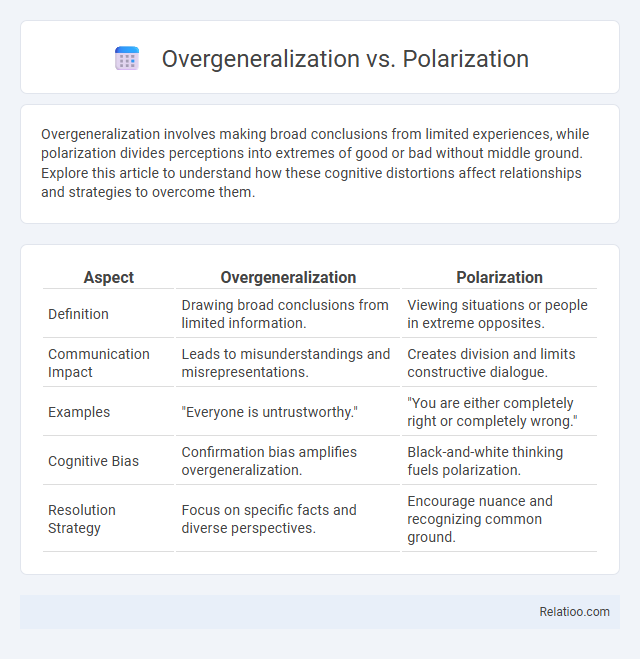Overgeneralization involves making broad conclusions from limited experiences, while polarization divides perceptions into extremes of good or bad without middle ground. Explore this article to understand how these cognitive distortions affect relationships and strategies to overcome them.
Table of Comparison
| Aspect | Overgeneralization | Polarization |
|---|---|---|
| Definition | Drawing broad conclusions from limited information. | Viewing situations or people in extreme opposites. |
| Communication Impact | Leads to misunderstandings and misrepresentations. | Creates division and limits constructive dialogue. |
| Examples | "Everyone is untrustworthy." | "You are either completely right or completely wrong." |
| Cognitive Bias | Confirmation bias amplifies overgeneralization. | Black-and-white thinking fuels polarization. |
| Resolution Strategy | Focus on specific facts and diverse perspectives. | Encourage nuance and recognizing common ground. |
Understanding Overgeneralization and Polarization
Overgeneralization occurs when You apply a single negative experience to all similar situations, resulting in a distorted worldview that ignores exceptions. Polarization involves viewing experiences or people in extreme, black-and-white terms, such as all good or all bad, which limits nuanced understanding. Recognizing these cognitive distortions improves emotional regulation and decision-making by promoting balanced, accurate perceptions.
Defining Overgeneralization: Key Concepts
Overgeneralization involves making broad claims based on limited evidence, often leading to inaccurate conclusions. It differs from polarization, which exaggerates differences into extremes, and from polarization's counterpart, overgeneralization, which oversimplifies complexities in Your thinking or analysis. Understanding overgeneralization helps identify flawed reasoning patterns that can distort Your judgment and decision-making processes.
What is Polarization? An Overview
Polarization refers to the cognitive distortion where individuals view situations or people in extreme, opposite terms, such as all good or all bad, without acknowledging any middle ground. This black-and-white thinking can affect relationships, decision-making, and emotional well-being by limiting your ability to see complexities and nuanced perspectives. Understanding polarization helps you recognize this bias and work towards more balanced, realistic thinking patterns.
Psychological Foundations of Overgeneralization
Overgeneralization in psychology involves drawing broad conclusions from a single event, often leading to pervasive negative beliefs about oneself or the world. This cognitive distortion is rooted in maladaptive schema development, where isolated experiences are incorrectly internalized as universal truths, impacting emotional regulation and decision-making. Polarization, a related but distinct distortion, categorizes experiences into extreme opposites, whereas overgeneralization specifically amplifies one negative outcome to all contexts.
Cognitive Mechanisms Behind Polarization
Polarization in cognition arises from biased information processing where individuals favor extreme opinions, often due to selective exposure and confirmation bias. Your brain tends to reinforce existing beliefs by filtering contradictory data, strengthening in-group identification, and amplifying affective responses. Understanding these cognitive mechanisms helps mitigate polarization by promoting critical thinking and balanced perspective-taking.
Real-World Examples of Overgeneralization
Overgeneralization occurs when individuals draw broad conclusions based on limited experiences, such as believing all coworkers are untrustworthy after one negative encounter. Polarization, in contrast, involves viewing situations or people in extreme, black-and-white terms without recognizing nuances. An example of overgeneralization is a student failing one exam and concluding they will fail the entire course, which highlights cognitive distortions often addressed in cognitive-behavioral therapy.
Polarization in Social and Political Contexts
Polarization in social and political contexts refers to the growing division between opposing groups, often characterized by extreme viewpoints and reduced willingness to compromise. This phenomenon intensifies ideological conflicts, fragmenting societies and diminishing constructive dialogue. Unlike overgeneralization, which involves broad conclusions from limited data, polarization creates entrenched partisanship that undermines democratic processes and social cohesion.
Consequences of Overgeneralization and Polarization
Overgeneralization can lead to distorted thinking patterns that negatively impact Your decision-making and relationships by causing you to view isolated incidents as universal truths. Polarization, or black-and-white thinking, often results in extreme judgments and reduced empathy, limiting Your ability to see nuances and resolve conflicts effectively. Both cognitive distortions contribute to increased stress, misunderstandings, and impaired communication in personal and professional contexts.
Strategies to Overcome Overgeneralization and Polarization
Overgeneralization and polarization often lead to cognitive distortions that impact decision-making and interpersonal relationships. Effective strategies to overcome these include cognitive-behavioral techniques such as challenging absolute statements, practicing mindfulness to increase awareness of thought patterns, and seeking balanced perspectives through evidence-based reasoning. Implementing these methods helps reduce black-and-white thinking and fosters more nuanced and flexible cognitive processing.
Fostering Balanced Thinking in a Polarized World
Overgeneralization and polarization often lead to rigid thinking patterns, causing individuals to see situations and people in extremes rather than recognizing nuance. Fostering balanced thinking involves challenging these cognitive distortions by encouraging Your awareness of diverse perspectives and the complexity inherent in most issues. Emphasizing empathy and critical reflection helps break down mental barriers, promoting more nuanced and constructive dialogue in a polarized world.

Infographic: Overgeneralization vs Polarization
 relatioo.com
relatioo.com